Nearly 60 Journalists Arrested During Iran Protests
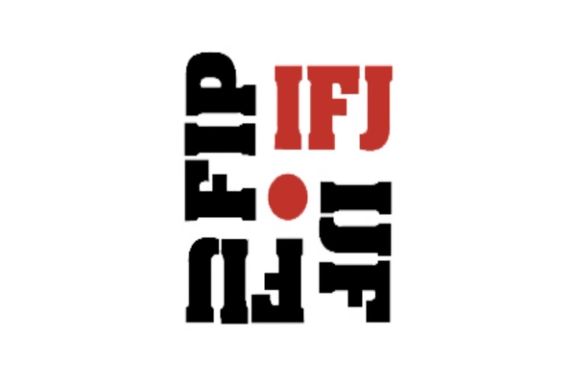
An international NGO says at least 57 journalists have been arrested in Iran since September during popular protests against the Islamic Republic.

An international NGO says at least 57 journalists have been arrested in Iran since September during popular protests against the Islamic Republic.
The Brussels-based International Federation of Journalists said on Tuesday only 30 of the 57 detained journalists have been reportedly released so far.
According to the Federation, five journalists were serving their sentences in Iranian prisons before protests erupt following the death of Kurdish woman Mahsa Amini in police custody in mid-September.
In the past months, the International Federation of Journalists issued several statements calling on the Iranian authorities to end arrests of journalists and to release those imprisoned immediately.
Anthony Bellanger, Secretary General of the Federation of Journalists said, “We ask the Iranian authorities not to use the coverage of national protests as an excuse to suppress the media. Every citizen in Iran has the right to know what is going on.”
He went on to say that “Our colleagues should be released immediately and be allowed to report the events freely.”
“We remind the Iranian authorities that freedom of expression is a fundamental right of all Iranian citizens, including journalists,” underlined Bellanger.
Niloufar Hamedi, Elahe Mohammadi, and Ehsan Pirbornabash are among the journalists who are still in custody.
There are no exact figures on the number of people arrested during the protests, but some sources say nearly 20,000 people have been detained.

As the Islamic regime in Iran is executing protesters, some politicians in the system call for calm and urge the government not to resort to more violence.
Lawmaker Shahryar Haydari said in an interview that "the country cannot be controlled with military confrontations with protesters."
He added that the committee is reviewing the government's approach to offer its suggestions for a way out of the current crisis. However, he added that it is up to the Iranian Judiciary to decide who should be pardoned and who should be punished.
Haydari said the Judiciary should pardon all those who simply protested in the streets and did not engage in violence. Referring to the execution of two protesters in less than one week, the lawmaker suggested that the government should not follow policies that increase tensions in society.
He further claimed that there have been fewer protests in recent days, but the government should not think protesters have given up their demands. The government should listen to them and President Ebrahim Raisi should be personally accountable for all the problems in the country.
However, a hardliner lawmaker Mostafa Mirsalim said Wednesday that the Judiciary should execute protesters quickly - within ten days after their arrest.
Haydari, stressing that military confrontation with the protests cannot solve the country's problems, called for economic solutions for the people's financial problems.
But that is one goal Raisi cannot accomplish by himself without a major change in foreign and domestic policies, a herculean task hinging on support by the authoritarian ruler Ali Khamenei.

Meanwhile, reformist sociologist and political activist Hamid Reza Jalaeipour said in an interview with Etemad Online that "Protests have still not entered a revolutionary phase, but they will, if the situation becomes increasingly critical. He added that the execution of a young protester, Mohsen Shekari on December 8 has deeply moved and agitated even those Iranians who were not actively taking part in the protests.
Jalaeipour said that most of those protesting in the streets are women and young Iranians including students. Nonetheless, he added, around 70 percent of Iranians are still silent and have not aligned with the opposition although they are not happy with the government's performance.
He pointed out that what is happening in Iran is not a riot. "Riots end soon but this movement is continuing. It has so many artistic and cultural manifestations and it has attracted worldwide support," Jalaipour said, and added that the government should allow these demands to be voiced. But unfortunately, the more politically active the society becomes, the less openness the government shows.
"During the past 90 days while this movement has been going on, the government has not tried to convince the people that it cares for their views. If this approach continues…a revolutionary phase might start," he said, adding that "The government has managed to control the situation during the past three months, but it cost hundreds of lives."
Jalaeipour added that some of the five million elders in the country are looking for conservative solutions. But this country has about 20 million youths and some 38 million others in between the two groups. The ideologically minded elders control the government regardless of what the other 58 million want. If they feel really fed up, they might end their silence.
Meanwhile, reformist politician Mehdi Ayati told Rouydad24 that if the government uses more violence against protesters, street unrest might go underground. He stressed: "Violence is not the right answer to [protests.]"
Although it might be too late, people will be happy when the government takes their demands and views seriously. But it has ignored the public’s demands and views for a long time. It should have attended to the needs of young people and women earlier.
Ayati, a former lawmaker, said that if the government wants to make up for its shortcomings, the first step is to avoid violence. He warned that violence will boost dissent to an uncontrollable level.

Iran’s Judiciary says 400 people have been sentenced to prison terms of between 2 to 10 years for participation in Tehran protests during the uprising against the regime.
“In hearings on cases of rioters in Tehran province, 160 people were sentenced to between five to 10 years in prison, 80 people to two to five years and 160 people up to two years,” Tehran’s judiciary chief Ali Alghasi-Mehr said Tuesday.
He also noted that 70 people have been fined without giving further details.
This comes a day after the regime hanged the second protester charging him with killing two members of security forces.
The Islamic Republic announced Monday that Majidreza Rahnavard, 23, had been executed in public in the north-eastern religious city of Mashhad.
Mohsen Shekari was the first protester hanged on December 8. The 23-year-old man was accused by the judiciary of just blocking a street and injuring a Basij militia.
Meanwhile, the number of people killed by security forces during the protest movement since mid-September has risen to 493.
The US-based Human Rights Activists News Agency (HRANA) announced in its latest report that from September 17 until Tuesday, December 13, at least 493 protestors have been killed, of which at least 68 were minors.
While the Islamic Republic has not provided accurate figures of those detained in the recent protests, the watchdog went on to say that at least 18,424 protesters have been arrested including 632 students.
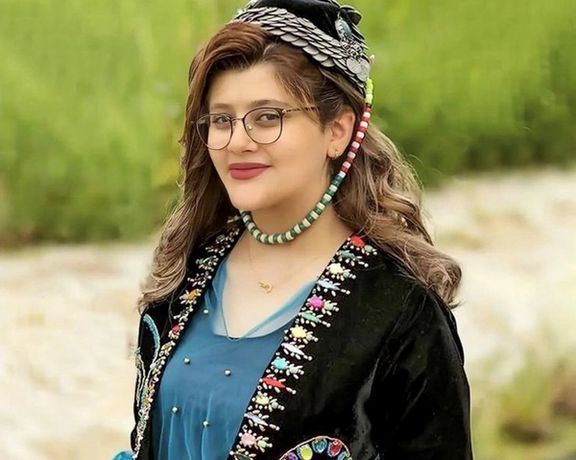
Iran appears set to be ousted from a UN women's body on Wednesday for policies contrary to the rights of women and girls, but several countries are expected to abstain.
The United States requested the vote after Mahsa Amini, a 22-year-old woman died in hijab police custody in September with deadly blows to her head. The incident triggered nationwide anti-regime protests during which more young women were killed.
The 54-member UN Economic and Social Council (ECOSOC) will vote on a US-drafted resolution to "remove with immediate effect the Islamic Republic of Iran from the Commission on the Status of Women for the remainder of its 2022-2026 term."
The 45-member Commission on the Status of Women meets annually every March and aims to promote gender equality and the empowerment of women. A US official told Reuters they had "consistently seen growing support" to remove Iran.
Iran, 17 other states and the Palestinians argued in a letter to ECOSOC on Monday that a vote "will undoubtedly create an unwelcome precedent that will ultimately prevent other Member States with different cultures, customs and traditions ... from contributing to the activities of such Commissions."
But Western countries and human rights defenders say Iran’s laws and policies severely discriminate against women and that is a universal rights issue.
Only five of the signatories to the letter are currently ECOSOC members and able to vote on Wednesday.
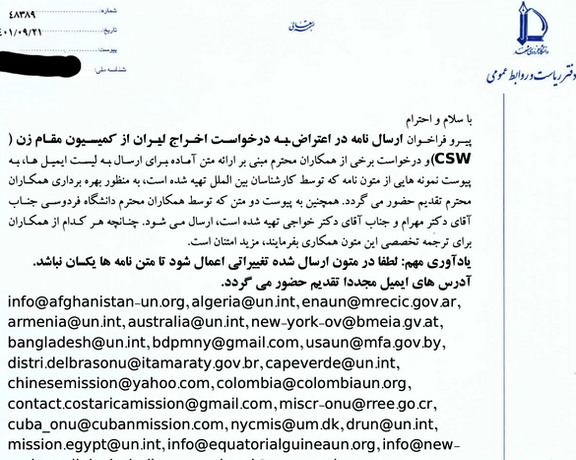
On the eve of a vote to expel the Islamic Republic from the UN women’s commission, leaked documents reveal a behind-the-scenes campaign to stop the move.
According to some documents obtained by Iran International, the Iranian regime is exerting pressure on academic figures to send letters to numerous global bodies to urge them to vote against the move. Among the documents are an official letter from an advisor of the head of Ferdowsi University of Mashhad to her colleagues with the list of emails of UN missions and a list of points to be mentioned in the correspondence by the professors.
The Commission on the Status of Women (CSW) is the principal global intergovernmental body exclusively dedicated to the promotion of gender equality and the empowerment of women. The 54-member UN Economic and Social Council (ECOSOC) will vote on whether to oust the Islamic Republic from the commission on December 14.
In the documents, a list of email addresses of UN missions of many countries as well as rights groups were provided, and university professors were asked to write to them in an attempt to prevent Iran’s expulsion initiated by the United States and supported by others. Samples letters were also given to the academics to use them as templates, but they were asked to change the wordings of the letters a bit so that it would not be obvious that they were part of a state-orchestrated campaign.
The sample letters are a collection of the regime’s propaganda lines blaming foreign powers for the current wave of protests that began in mid-September following the death of 22-year-old Mahsa Amini in custody of hijab police. Such hackneyed lines include blaming other countries for instigating the rallies, blaming the US for using UN mechanisms as political tools, and blaming sanctions by Western countries as the main reason behind the country’s economic woes.
The academics were also asked to mention the claims that women and men enjoy equal rights in the Islamic Republic and that Iranian women have been present in all economic fields and have made great achievements. Such bogus claims were also read out during a UN Human Rights Council meeting late in November held to discuss the deteriorating situation in Iran, especially with respect to women and children.
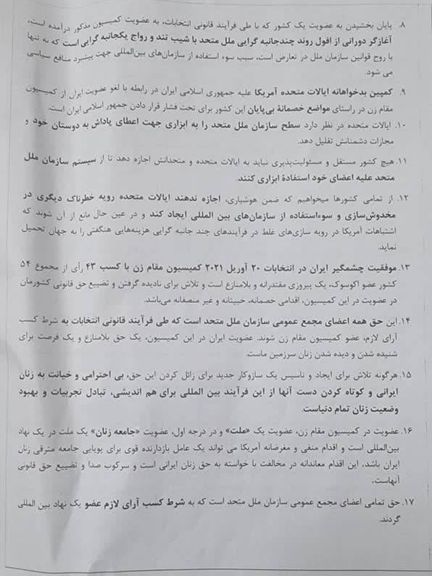
The equality of men and women in Iran is evidently untrue. The Islamic Republic’s constitution clearly states that women are considered as inferior to men in terms of inheritance, testifying in courts and in many other areas according to the Islamic law or sharia. Women in Iran are not allowed to travel abroad without the permission of a male guardian, their share in inheritance is half of what male family members receive -- the financial compensation paid to the victim or heirs of a victim in cases of death, is also half of that of a man.
Among the other points that the academics were asked to mention in their letters to members of the commission is warning them that the expulsion of the Islamic Republic sets a precedent that may be used against other members in the future.
The first step by the United Nations to hold the Islamic Republic accountable for its crackdown on protesters was creating a fact-finding mission by the Human Rights Council and the second move can be the vote to kick the regime off the Commission on the Status of Women. The Geneva-based UN Human Rights Council voted on November 24 to launch an independent investigation into the regime’s deadly repression of protests that has killed around 500 civilians, including about 60 children.
Late in November, the United States circulated a draft resolution on the move, that denounces Iran's policies as "flagrantly contrary to the human rights of women and girls and to the mandate of the Commission on the Status of Women." The US-drafted resolution would "remove with immediate effect the Islamic Republic, which has just started a four-year term on the 45-member commission.
In an interview with MSNBC Sunday US Special Envoy for Iran Robert Malley said, “it makes no sense for Iran to be sitting on a commission whose role is to promote the rights of women when they are doing exactly the opposite.”
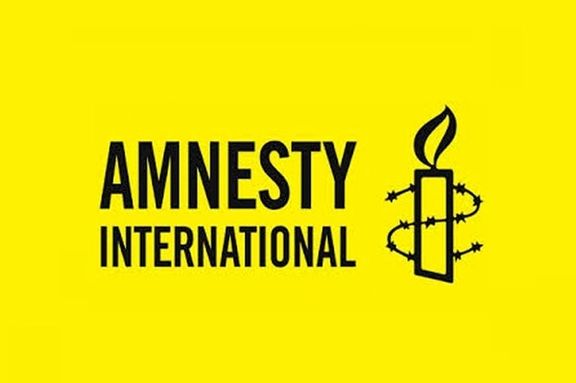
Amnesty International says the Iranian regime is executing individuals to spread fear and take revenge on protesters who stand up against the Islamic Republic.
Responding to the Iranian authorities’ public execution of Majidreza Rahnavard, Diana Eltahawy, Amnesty International’s Deputy Director for the Middle East and North Africa, said Monday “the horrific public execution…exposes Iran’s judiciary for what it is: a tool of repression sending individuals to the gallows to spread fear and exacting revenge on protesters daring to stand up to the status quo.”
The Islamic Republic hanged a second protester, Majidreza Rahnavard in less than a week in public on Monday after charging him with the alleged killing two members of security forces.
Eltahawy further added that the arbitrary execution of the youth “lays bare the extent of the Iranian authorities’ assault on the right to life and their disregard for even maintaining a façade of meaningful judicial proceedings.”
Amnesty urged the international community to take all necessary measures to pressure the Iranian authorities to stop executions and annule death sentences.
The body has identified 20 people at risk of execution in connection with the protests among them 11 sentenced to death.
Three individuals, according to Amnesty, have undergone trials on capital charges and are either at risk of being sentenced to death or may have already been sentenced to death, with no publicly available information on their status.
Six others may be awaiting or undergoing trial on charges carrying the death penalty, stated the international human rights organization.